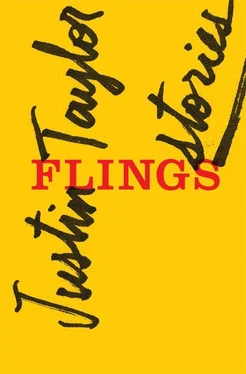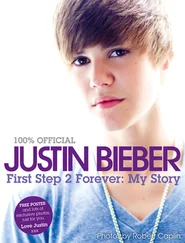Back at her table she saw that all the flyers for the contest had been taken, and her sign knocked over, but her pyramid of books had not been so much as jostled. Her monument was perfectly undisturbed. She did not know whether to feel injured or pleased. All those copies of her precious book — she left them as they were. Let the janitors puzzle over them or slide them unread into a black vat of trash. It no longer mattered, if it ever had, and there were four hundred more copies boxed up unvanquished back at her Oregon home. Her work would become a little more rare, was all, which maybe wasn’t such a bad thing. The torn-off page with Cal’s phone number on it seemed to warm the pocket in which it lay. She was a beautiful woman in a smart dress and dark stockings. The world itself seemed to barely know what to do with her. She had no old friends.
Seventy-two years old and I’m the last person I know who drinks real coffee. Everyone else gave in to decaf years ago. Bad hearts, they’ve got, or they don’t want to be kept up. Gerald felt that coffee was the root cause of my insomnia but I never could believe that and I still don’t. A strong cup in the morning hardly keeps me from a nap in the afternoon. It is only in the night I lie awake, alert and tossing, denied entry to the vault of sleep. Sometimes, when I know in my bones there will be no rest no matter what, I get out of bed and go make myself a cup and drink it while I watch TV or pace the house or sit out on the back porch and listen to the night: crickets and groaning air conditioners and faraway cars.
Tonight I’ve found a documentary about the ruins of São Paulo Cathedral in Macau. Built by Jesuits in the 1500s, operated for three hundred years or so, burnt down in 1835. Why never rebuilt? The program doesn’t say. But the stone facade survived the fire and has stood freely ever since. There’s a long shot of it silhouetted in sunset light, then a station break. All the commercials are for tax attorneys and prescription drugs. A fat-faced man in a blue suit says, “Bankruptcy isn’t the end — it’s a new beginning!” Grinning AARP members in tracksuits chat about pills for their bladders, memory, blood sugar, skin, pain, sleep — everything managed and nothing solved, ask your doctor today.
When the program returns there are close-ups of the church’s stonework. The camera lingers over waggle-tongued demons, gray saints, a great ship frozen among scrolling waves. I imagine climbing the steep steps, can practically feel the island sun on our necks and arms and Gerald’s bald spot (he preferred visors to hats), pausing to catch our breath and mop our brows in the relative comfort of the facade’s shadow before passing through its tall archway and into the hot open land that was once the cathedral. “By now it’s been nothing for almost as long as it was ever something,” I say, speaking the words aloud to the empty living room. The program says that the grounds have been made a World Heritage Site. And so the ruin’s future is secure, its preservation assured.
The program ends but the night keeps going.
Thirty-five years apiece in the New York City public school system — I taught high school English; Gerald taught middle school science and a bit of shop. Twenty-nine of those thirty-five years in the row house in the Slope, riding the subway and raising the boys and hacking away at the mortgage and finally owning it outright just in time to sell when we took our retirements and went south — before the market did, thank God. “Turncoat,” my sister, Elsie, said about us leaving. “You’ve gone soft.” But Elsie and Donald never had children — they couldn’t — so what would she know about it?
We moved to a development called Canyon Lakes. This being South Florida, there is of course no canyon. As for the so-called lakes, they are skinny man-made channels of murky water in which you can neither fish nor swim. They ribbon through the development, brushing property lines so that every unit can be listed as “waterfront.” We do get birds, ducks and heron, sometimes ibis, and minnows at the grass banks for visiting grandkids to catch in Dixie cups and torture — they squeeze them between their fingers and the little fish burst like grapes.
My son Dennis is still in the city, but Keith, the older one, came down about a year after we did, for a job that ended up falling through — but he found something else and stayed. He met Heather and married her and they live twenty minutes down the road in a development like ours, only it’s townhouses instead of stand-alones and the people there are younger: buying their first homes, starting their families. We have a clubhouse with a little theater; they have a community center with a little playroom. Everything in its right place, I suppose, though that does beg the question of what Keith and Heather are doing there. “We’re waiting for the right time,” Keith always says, and then refuses to elaborate at all. I have dinner with my son and his wife once a week.
We had six, nearly seven good years in Florida, despite the onset of what Gerald called “old folks’ disease”—his catchall for the host of complaints and small agonies that infringe with the gaining years. Our joints ached; we were advised to watch how we ate. We caught fewer colds in the warm weather, yes, but whatever we caught would linger. Gunked sinuses. Aspirin regimens. Prescription bottles in the medicine cabinet, on the nightstand, by the kitchen sink — chatting about side effects like the people on TV. We got good about sunscreen. We stood on the decks of cruise ships. Then Gerald got sick in his lungs and then he died.
All our New York years I kept my hair short — very sensible and teacherly, and only ever dyed its own natural color. In Florida I found all the ladies wore their hair like this, permed or close-cropped or whatever it took to mask the thinning and recession, keep themselves regulars at the salon, give themselves somewhere to go. I had no intention of living like that, besides which my hair is still nearly as thick as when I was a girl, so as soon as we got here I stopped coloring it and grew myself a white braid that was all the talk of the clubhouse whenever I went in for a turn on the StairMaster or a dip in the pool.
The night I left Gerald’s body at the hospital I came home and cut my braid off, coiled the limp thing up like a length of rope, stuck it in a jewelry box, and shut the lid. Now I’m one more short-haired widow after whom nobody whispers. Sometimes while I’m exercising I’ll wonder, What is the point of this? The hope is for health, of course, and that the sunlight and heat and exertion will prove exhausting, set the foundation for a good night’s well-earned rest. Sometimes it happens this way, but not often. It’s more like my body and mind are disconnected, my days and nights non sequitur to each other. Sometimes I feel like the hole in my life is even larger than my life ever was and that I live inside it, potted like a houseplant in the soil of my grief.
Midmorning I make a pot of coffee and set it out on the counter to cool. I put the TV on but there’s nothing good to watch: soap operas on the networks, shouting anchors on the cable news, and either way you get more commercials for lawyers and drugs. I shut the TV off, put a load of laundry in, then go outside.
By day my patio with its peach-colored tiles hardly seems to be the same place I pass my endless nights. I sit down at the table — tempered glass on a white metal frame; the chairs woven plastic, also white; and all of it lightly filmed in dirt — and am staring out through my fine-mesh black bug screens at the houses across the calm brown water when, with a kind of calm shock, I notice something so utterly unexpected it hardly occurs to me to be afraid. An alligator — gray-green, perhaps seven feet nose to tail, having apparently crawled out of the water and up the stumpy step of the low bank — has laid itself out in a sunny spot halfway up my grass and fallen asleep.
Читать дальше












